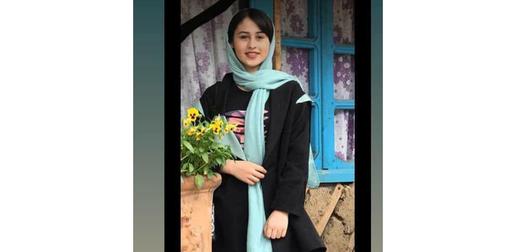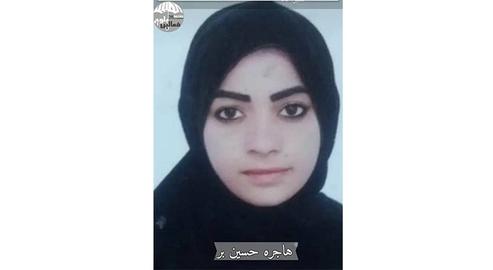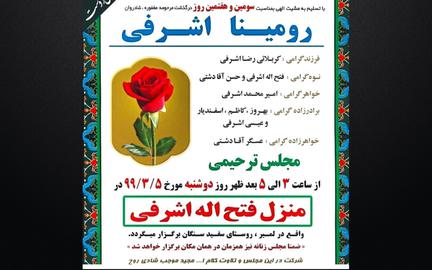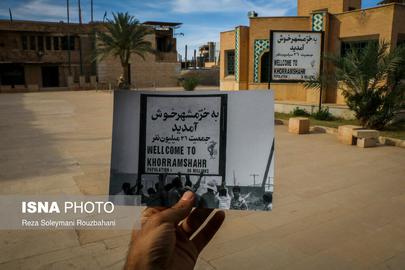The murder of a 13-year-old girl by her father has sent shockwaves around Iran, prompting widespread debate as well as contradictory accounts of the events that led up to the crime. After local and national Iranian media attempted to bury the story, IranWire covered it on May 25, forcing the government to acknowledge the tragic event.
"Thirteen-year-old student Romina Ashrafi was arrested for falling in love and fleeing to marry a boy she loved. She was returned to her family by a judge from her hometown, despite her pleas not to hand her over to her father. Unfortunately, she was brutally killed by her father in her sleep on Thursday, May 21."
This a text message from a source close to the family of Romina Ashrafi, a teenager from Lamir, a small town of about 5,000 people in Gilan province’s Talesh County.
"Romina was born in 2006," the source told IranWire. "She befriended a boy from her hometown. Her family was not traditional, but her father was violent, an addict, and unemployed. She probably tried to escape because of the situation at home. Her father has been arrested and handed over to the judiciary, but what is the use? Romina is dead, and it happened in the worst possible way."
The source said that when Ashrafi and her male friend, whose name has not been disclosed, were arrested, she repeatedly asked the police, law enforcement officials and the judge not to hand her back to her family. She had told officers she would not be safe at her father's house. "Instead of sending Romina to one of her relatives or friends until her father's anger subsided, with recklessness and indifference, the judge sent her back to her father's house. At the same time, relatives of the family, instead of mediating and calming the situation down, made provocative remarks that further fueled Romina's father's anger and helped cause the tragedy."
The source added that because the girl's father was not in a “normal” state of mind at the time of the murder, his sentence could be reduced. "Romina's father, according to his confession at the time of the murder, was under the influence of psychedelic pills. The family was not religious, but the father was an addict. On the morning of May 21, he sent Romina's mother out of the house and cut his daughter's throat.”
Conflicting Accounts of What Happened
IranWire Persian published this story on Monday, May 25. But soon after, other stories emerged, many of them contradicting the original account.
One person who contacted IranWire said Romina Ashrafi had run off with a man going by the name of Bahman, not a teenager. "Shouldn't this man who had a relationship with an underage child be prosecuted?” the source asked, adding that Bahman was between 28 and 30 years of age. “He is known not to be a good or decent person. He had previously done the same with two other girls, and the girls' families had got the girls back. Romina and Bahman have only been friends for a month and a half. Romina ran away with him of her own free will, but after they were arrested, she said she did not intend to marry him and regretted it.”
The source said that after Ashrafi fled with Bahman, her father went to Bahman's father's house and asked about his son. "The boy's parents have been in dispute for a long time, and they do not talk to each other, or to their son,” the source said. When the girl’s father arrived, he was insulted, and it was this that made him “a hundred times angrier,” not the response of Ashrafi’s relatives as a previous account had claimed.
According to local news channels that eventually covered the story after avoiding it, witnesses spoke of the “horrifying and disturbing” murder scene. They also confirmed that the girl’s father had been arrested and handed over to the judiciary.
The person IranWire spoke to condemned the violence perpetrated by the father, but added: "Romina's father was not an addict; he did not use drugs. Perhaps someone said this so that he would get a lighter sentence in a court of law. He is a religious man, and has been on a pilgrimage to Karbala.” The source also said that while the Ashrafi family are Shia Muslims, Bahman's family are Sunni, and the roots of what happened link back to long-running disputes in that region of Iran.
According to another person who contacted IranWire, Romina Ashrafi and Bahman intended to get married and Ashrafi's father was furious. He said if she returned home he would not harm her, but if she stayed with Bahman, he would kill her. She went back to her family and after a further few days in custody, Bahman was released. The details around his release are unclear. Some say the police released him in exchange for a million tomans [$62], while others say he paid that money as bail until his trial got underway.
One of the people who contacted IranWire said that the situation was initially calm at the family home when Ashrafi returned. But while she was sleeping, her father received a message from Bahman. “Whatever the content of this message was, it drove her father mad. He locked the bathroom door behind her mother and killed the poor child in her sleep.”
Another person said that following the murder, Romina Ashrafi’s mother took her son and left the family house, and is calling for her husband to be punished in a court of law.
No Chance for Justice
According to the Islamic Penal Code, Ashrafi’s father will not be subjected to retribution, the punishment normally handed down to people found guilty of premeditated murder. Article 220 of the Islamic Penal Code states: "the father or paternal grandfather who kills his child... will only be sentenced to pay the blood money to the heir of the victim."
An Iran-based lawyer who worked on a similar murder case in the village of Fadafan in Kashmar in 2019 said of his case at the time: "Local courts handle such cases with local judges; they will normally hand down the minimum punishment; that means three years in prison.”
A person going by the name Sima said on Twitter: "I don't comment on other areas of the country, but I don't think anyone in Talesh will praise the killer in an honor killing case. In the past, many girls have been involved in love affairs and (for better or worse) have used a traditional solution to apply their views, but such a murder is, as far as I know, rare in this region.”
On May 13, 2020, just six days before Romina Ashrafi’s murder, the Baluch Activists' Campaign reported that Hajareh Hosseinbor, a young Baluch woman, had been murdered by her husband. Her husband’s relatives described the murder as an honor killing, but Hosseinpor’s relatives and neighbors claimed her husband was a drug addict, and that he used to beat her. Following the news of her murder, there were reports that another woman, a 40-year-old called Zobaideh, had died after her husband set her on fire. He allegedly tried to stage the murder as an act of self-immolation and fled the scene.
Whatever happened in Romina Ashrafi's s case, it is clear that Iran’s Islamic Penal Code cannot ensure justice will be carried out. There was nothing in place to protect 13-year-old Ashrafi, not when she left home, not when she returned, and not when she was murdered. Her father will not face a heavy sentence. “Bahram” has already escaped justice because he has been released after settling a negligible amount.
It is instructive to consider the condolences announcement for this recent horrific death, which includes photographs of male mourners from Romina Ashrafi’s family, including her father. The memorial does not feature a photograph of Ashrafi, and the names of her mother, sisters, and other female relatives are nowhere to be seen. They, like the victim, appear to be subjects of "honor" for the men of their tribe, and nothing more.
visit the accountability section
In this section of Iran Wire, you can contact the officials and launch your campaign for various problems



























comments